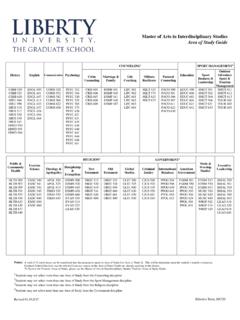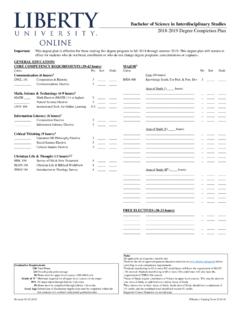Transcription of Xavier University of Louisiana
1 Xavier University of Louisiana * The Institute for Black Catholic Studies * *Master of Theology* An interdisciplinary Degree in Pastoral Studies Handbook (Policies, Procedures, and Information) IBCS Summer Session MASTER OF THEOLOGY Page 2 of 43 C O N T E N T S History 3 Mission Statement 9 The Institute Experience 10 Educational Philosophy 11 Library Collection and Research Resources 12 Purpose of the Degree Program 13-14 Application Process and Admission Requirements 15-16 Tuition and Fees 17-18 Academic Information 19 Qualifying Examination 22 The Practicum (Plan A) 24 The Practicum (Plan B) 27 Oral Comprehensive Examination 31 Master of Theology Degree ( ) Curriculum 32 Administration 38 Xavier University OF Louisiana MASTER OF THEOLOGY Page 3 of 43 THE INSTITUTE FOR BLACK CATHOLIC STUDIES HISTORY The historical roots of the Institute for Black Catholic Studies at Xavier University of Louisiana are intertwined with those of the National Black Catholic Clergy Caucus (NBCCC), which was founded in 1968 and the Black Catholic Theological Symposium (BCTS) that convened for the first time October 12-15, 1978.
2 The Symposium was organized under the auspices of the NBCCC and directed by the creative leadership of the Reverend Thaddeus Posey, OFM Cap. In planning this gathering, Father Posey worked in association with the Reverends Augustus Taylor and David Benz and consulted with the Reverend Dr. Joseph Nearon, SSS and Sister Jamie Phelps, OP. Their efforts brought together Black Catholic priests and vowed religious women and men who were trained as pastoral and intellectual leaders and critical thinkers in the various theological and ecclesial disciplines. This first assembly of the Symposium was held at the Baltimore Motherhouse of the Oblate Sisters of Providence, the first Catholic religious congregation of vowed Black women. Participants presented formal papers and responses that addressed some of the topics crucial to the development of a distinctively Black Catholic theological and pastoral response to the Black condition.
3 These topics included values, self-concept, liturgy, catechesis, and spirituality. The papers from this meeting were edited under the direction of Father Posey and published as Theology: A Portrait in Black. From Proposal to 'Pilot Program' In the effort to sustain and support the pastoral theological reflection and work of Black Catholic pastors and educators, Father Posey, with the encouragement of other Symposium participants, presented a second proposal to the 1979 spring meeting of the Board of Directors of the NBCCC. This proposal called for the establishment of an educational institute with a curriculum organized around the pastoral and intellectual needs of Black Catholics and under their leadership and direction. Still, such an educational institute was not an altogether new idea. In 1969, soon after the founding of the NBCCC, Father Augustus Taylor, with genuine foresight, suggested the creation of a structured academic program through which to share Black Catholic viewpoints among ourselves and with the hierarchy, pastors, and religious women and men ministering in African American communities.
4 Given its embryonic state, the NBCCC was unable to actualize this idea at the time. However, by 1979, with more than a decade of organizational and programmatic experience, the National Black Clergy Caucus was ready to entertain and oversee the implementation of such a plan. Furthermore, in the thinking of the NBCCC Board, Xavier University of Louisiana the only Black Catholic University not only in the United States, but also in the Western hemisphere was the most likely academic site to accredit and to host the program. With the approval of the NBCCC, Father Posey met with Dr. Norman Francis, President of Xavier University in New Orleans, to explore hosting at Xavier an educational institute focused on the pastoral and theological needs of Black Catholics. Further, the NBCCC Board MASTER OF THEOLOGY Page 4 of 43 instructed Father Posey to form a consultant group for the project.
5 Members of this group included the Reverends David Benz, Edward Branch, Sister Jamie Phelps, OP, and (the former Presentation of the Blessed Virgin Mary Sister, Toinette M. Eugene). Very quickly, plans got underway for a 'pilot program' for 1980. In order to give the proposal a broad base of support within the University and within the local Church, during the 1979-1980 academic year Dr. Francis and Father Posey scheduled a meeting with key administrators and faculty at Xavier University and with the Catholic bishops of the Archdiocese of New Orleans. At this meeting, at the request of Father Posey, Sister Phelps, who at the time was a doctoral candidate in systematic theology at the Catholic University of America, gave a presentation on the significance of such an educational program for the Church in its ministry to Black Catholics. The Emergence of the Institute for Black Catholic Studies The pilot run of what is now known as the Institute for Black Catholic Studies (IBCS) began in the summer of 1980.
6 The inaugural faculty and their courses were: the Reverend Dr. Cyprian Davis, OSB, who taught "Church History," the Reverend Dr. Joseph Nearon, SSS, who taught "Black Approaches to Scripture," and (the former Presentation of the Blessed Virgin Mary Sister) Toinette M. Eugene who taught "Black Approaches to Religious Education." Mr. Steve Wesley had been scheduled to teach "Catholic Education in the Black Community," but the Course was dropped. Father Posey served as Director of the Program. Sixteen (16) students registered for the first summer session. Classes were held in St. Joseph Residence Hall and in the office of Campus Ministry, which at the time was directed by the Reverend (now Bishop) Moses Anderson, SSE. In February 1982, the Board of Trustees of Xavier University approved the curriculum design of the Master Program in Pastoral Theology. This action empowered the Institute for Black Catholic Studies to initiate the Degree Program that would be accredited and awarded through the University 's Graduate School.
7 The faculty was expanded to include among others: Dr. Sister Thea Bowman, FSPA, who offered courses in African American Literature and Preaching; the Reverend Bede Abram, OFM Conv., STL, who replaced Toinette Eugene as instructor of "Black Approaches to Theology," and Dr. Delores Harrell, SND de Namur, who taught "Catholic Education in the Black Community." The first graduation of candidates for the program was held in July 1984. The graduates were Sister Eva Marie Lumas, SSS, Sister Addie Lorraine Walker, SSND, and Reverend James Voelker. The Development of Certificate and Enrichment Programs Although the years 1985 through 1993 were ones of programmatic and institutional development for the Institute, its growth and extension started almost immediately. Since the first summer session of the Institute, there has been a commitment to encourage and strengthen vocations to the priesthood and to the religious life within the Black Catholic community.
8 In 1981, the National Black Sisters' Conference (NBSC) designated a committee comprised of Sisters Elizabeth Hams, HVM, Rosetta Brown, OP, and Patricia Haley, SCN, to explore and to set up a program to support Black candidates and vowed religious, seminarians and clergy in their spiritual journey. One component of this program was to take place at the Institute. In consultation with Sister MASTER OF THEOLOGY Page 5 of 43 Phelps, the NBSC Committee designed and inaugurated the first session of the "Formation Program which was directed by Sister Haley and funded by the NBSC. The program aimed to challenge and to assist Black candidates and vowed religious, seminarians and clergy in growth, maturity and renewal in the spiritual life as well as to assist Vocation Formation Personnel of religious congregations in working with Black candidates. This program built on and benefited from the expertise the NBSC gained during the early and mid-1970 s when it conducted several Institutes in Formation.
9 By 1990 the Formation Program began to sponsor special sessions for those involved in the process of vocation discernment as well as to support lay women and men who are interested in personal spiritual growth and renewal. This undertaking has evolved to its present format and is known as the "Vocation Enrichment Program." During his tenure as Director, Father Joseph Nearon both stimulated and advocated the expansion of educational components within IBCS through the initiative of IBCS faculty, students, and alumni. The first of these expansions was the Master Catechist Certificate Program, a training and formation program for Christian educators and catechists ministering in the Black community. This program was coordinated and directed by Sisters Lumas and Walker. The Master Catechist Program was the result of their collaboration on their practicums for the Degree. In its early years the Master Catechist Program was funded by grants from the NBSC.
10 A second expansion came through a proposal presented by Ms. Janice Jackson and Ms. Roxanne Byrd for youth ministry, as well as the work of Ms. Valerie Shields for a Certificate Practicum. In the summer of 1992, the Certificate Program in 'Youth Ministry' was established under the collaborative leadership of Sister Jane Nesmith, SBS, and Ms. Shields. A program addressing leadership in the parish was first suggested by Father Nearon and Sister Haley. The Reverend Dr. Donald Sterling drew up the initial plans. The Certificate Program in Leadership in the Faith Community' was conducted for the first time in the summer of 1993 under the direction of Mr. Leon Henderson. Administrative Development The emergence and growth of the various IBCS educational components has called forth the creative, imaginative, and pedagogical talents as well as the administrative, evaluative, and consultative gifts of many Black Catholic women and men.





